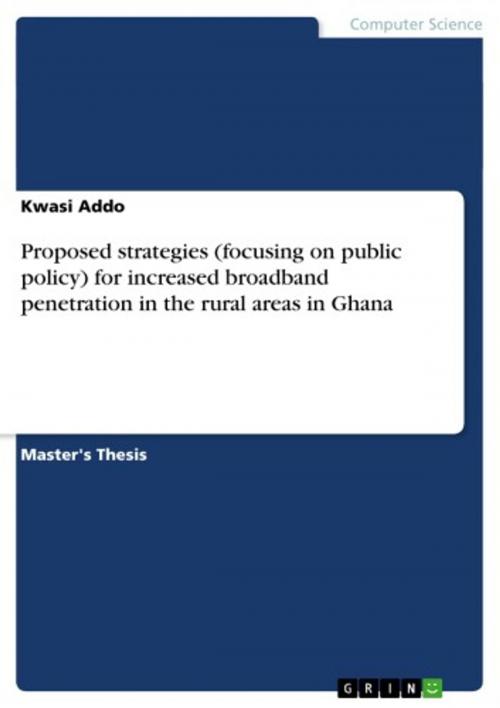Proposed strategies (focusing on public policy) for increased broadband penetration in the rural areas in Ghana
Nonfiction, Computers, General Computing| Author: | Kwasi Addo | ISBN: | 9783656079125 |
| Publisher: | GRIN Publishing | Publication: | December 8, 2011 |
| Imprint: | GRIN Publishing | Language: | English |
| Author: | Kwasi Addo |
| ISBN: | 9783656079125 |
| Publisher: | GRIN Publishing |
| Publication: | December 8, 2011 |
| Imprint: | GRIN Publishing |
| Language: | English |
Master's Thesis from the year 2010 in the subject Computer Science - Miscellaneous, grade: none, Aalborg University (Aalborg University, Denmark), course: Master in Information and Communication Technology (MICT), language: English, abstract: The objective of this project is to outline possible strategies (focusing on public policy) to increase broadband penetration in the rural areas in Ghana. Currently, broadband penetration in Africa is 0.3% and it is expected to grow to 1.3% in the next five years. More of that growth will be through mobile connections because the fixed infrastructure is just not there. It is therefore expected that more than 60% of broadband connections will be accounted for by High Speed Packet Download Access (HSPDA), Long Term Evolution (LTE) and WiMAX. [Source: Africa Review July 2009 edition Page 27]. The expected result of the proposed policy is to stimulate increased broadband penetration in the rural areas. This may be useful to government, telecom companies, ISPs, etc and the rural folks. This will help government to bridge the gap between the urban and rural areas. It will also be useful to sectors like agriculture, health, education, communication, finance, market information, commerce, and governance. The telecom companies, ISPs, etc, will benefit in terms of taking advantage to analyze, invest and make profit for the sale of broadband for internet connectivity in the rural areas. Some feasibility studies will need to justify its viability though. Concerning the rural folks, there will be improvement in their standard of living. This is because as will be seen later, broadband penetration brings about improvement in the per capita Gross Domestic Product (GDP) of the areas of implementation. Rural farmers may by the use of the internet have access to a broader market compared to the 'limited market queens' who buy their products at very low prices and thus keeping them poor. Lots more other sectors of the economy will benefit from broadband penetration to the rural areas. For example, the financial sector and specifically the banks and insurance companies will now be in a better position to operate better in these areas. This is because of the increased means of communication.
Master's Thesis from the year 2010 in the subject Computer Science - Miscellaneous, grade: none, Aalborg University (Aalborg University, Denmark), course: Master in Information and Communication Technology (MICT), language: English, abstract: The objective of this project is to outline possible strategies (focusing on public policy) to increase broadband penetration in the rural areas in Ghana. Currently, broadband penetration in Africa is 0.3% and it is expected to grow to 1.3% in the next five years. More of that growth will be through mobile connections because the fixed infrastructure is just not there. It is therefore expected that more than 60% of broadband connections will be accounted for by High Speed Packet Download Access (HSPDA), Long Term Evolution (LTE) and WiMAX. [Source: Africa Review July 2009 edition Page 27]. The expected result of the proposed policy is to stimulate increased broadband penetration in the rural areas. This may be useful to government, telecom companies, ISPs, etc and the rural folks. This will help government to bridge the gap between the urban and rural areas. It will also be useful to sectors like agriculture, health, education, communication, finance, market information, commerce, and governance. The telecom companies, ISPs, etc, will benefit in terms of taking advantage to analyze, invest and make profit for the sale of broadband for internet connectivity in the rural areas. Some feasibility studies will need to justify its viability though. Concerning the rural folks, there will be improvement in their standard of living. This is because as will be seen later, broadband penetration brings about improvement in the per capita Gross Domestic Product (GDP) of the areas of implementation. Rural farmers may by the use of the internet have access to a broader market compared to the 'limited market queens' who buy their products at very low prices and thus keeping them poor. Lots more other sectors of the economy will benefit from broadband penetration to the rural areas. For example, the financial sector and specifically the banks and insurance companies will now be in a better position to operate better in these areas. This is because of the increased means of communication.















